List of Authors
>>About this blog
Recent blog post
|
[Marsha Horiuchi of Edo]
August 7, 2015 14:00
Last time, I wrote about Ningyocho, but I haven't written enough yet, so I'll add it.
There is a Western restaurant called "Koharuken" along the street of "Tamahide" in Oyakodon (next to Mima).
This is a restaurant started by a chef with Aritomo Yamagata of the Meiji era.
It is a very casual shop for the common people.
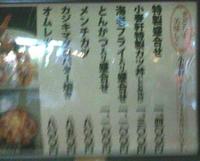
Last time, I had a lunch box for dinner and had it delicious at home.
Next, I would like to introduce the shops on the back side of "Edo Fire Flame Karakuri Ogura", "My French", and
It's Mina Fuku, a take-out shop for Odenone, reminds me of Osaka, a super common shop.
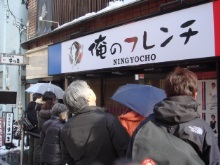 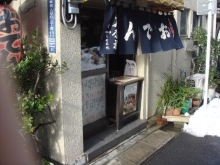
This time, as I walked all the way through amazake Yokomachi, I found a nostalgic candy store on the way (originally at Suitengu).
However, it has been relocated here) and Meijiza (Kabuki), which has been founded for 140 years. There
Turning the corner and walking a little bit, the long-established knife shop "Ubukeya", I like the sharpness and the file part.
I use a small nail cut.
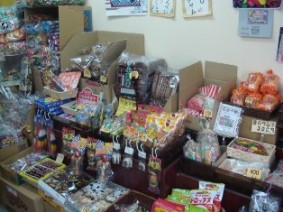 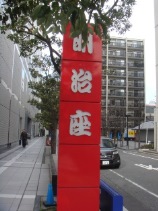
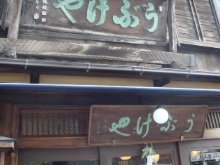 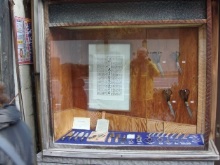
Ningyocho, where many such private shops remain, has a remnants of Osaka (Shitamachi) in the early to mid-Showa period.
Perhaps there is something that reminds me of, it reacts to the trees in front of the store and the drums of fire prevention water.
(I lived in Tomishima-cho, Nishi-ku, Osaka when I was little--it seems that everything is now Kawaguchimachi.)
Finally, this Ningyocho is a city that has undergone many hardships during the Great Fire of the Meiryaku era (1657) of the Edo period.
It has a long history as a stylish downtown area such as Kabuki, which was also a entertainment for the common people, and a flower street.
I thought to convey that atmosphere, I would like to introduce a photograph of the reproduction pattern at the Edo Tokyo Museum and write a brush.
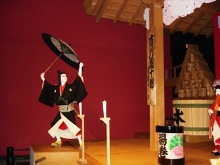 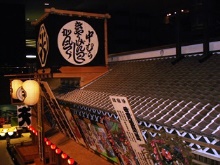
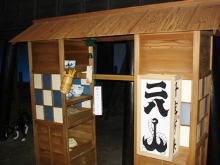
*"Sukeroku" dressed as Danjuro Ichikawa,
*Kabuki hut in Nakamuraza
*A stall in Nihachi soba
(2.8 = Jurokubun soba is less than 400 yen when converted to the current value)
[Nojinya]
August 6, 2015 09:00
I think that there are many people who go   abroad and all over Japan during summer and abroad and all over Japan during summer and summer vacation. For those who can't easily go to summer vacation due to work, etc., today is a proposal to enjoy the feeling of traveling in Chuo-ku. summer vacation. For those who can't easily go to summer vacation due to work, etc., today is a proposal to enjoy the feeling of traveling in Chuo-ku.
Chuo-ku is a cluster of antenna shops where you can enjoy shopping and meals of specialty products from all over Japan while staying in Tokyo. The antenna shop stamp rally in October is famous, but it seems that there are 26 stores around Nihonbashi, Ginza, Yaesu and Kyobashi. In the Edo period, a daimyo set up the Edo clan residence near Edo Castle, but is the antenna shop gathering in Chuo-ku called the modern version of the Edo clan residence (Kurayashiki)? 。 。
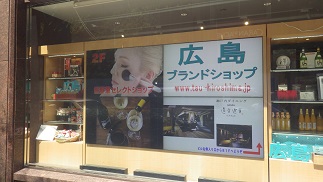
At the antenna shop in Chuo-ku, such as Ishikawa Hyakumangoku Monogatari Edo Honten (Ginza 2-chome) and TAU-Hiroshima Brand Shop (Ginza 1-chome), local high-class specialty products (Kanazawa lacquerware and Kumano brushes) over several floors. 。) Japanese sake, food (momiji bun). And while there are many large stores with eating space like eat-in, today I went to Hakodate's antenna shop "Hakodate I came" in Hakodate, a slightly unusual. 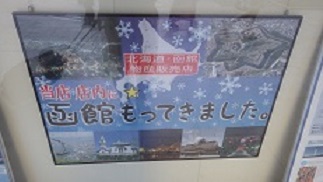 The location is Kyobashi 2-chome. Just above Kyobashi Subway Station, opposite Tokyo Square Garden. The location is Kyobashi 2-chome. Just above Kyobashi Subway Station, opposite Tokyo Square Garden.
As the naming says, "I've brought Hakodate," Hakodate's specialty products are sold separately from some spaces in Lawson  at convenience stores. at convenience stores. 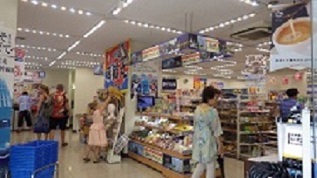 Not only Hakodate curry at Gotoken, but also squid, scallops, and yukky Hokkaido caramel series (condensed milk, butter, melon). And there's even the classic Trapist Monastery cookies. In addition to the food, it sells the cover of "Ikar Alien", which is being sold as a sightseeing guide character in Hakodate City, and is this Kyobashi or Hakodate Airport Not only Hakodate curry at Gotoken, but also squid, scallops, and yukky Hokkaido caramel series (condensed milk, butter, melon). And there's even the classic Trapist Monastery cookies. In addition to the food, it sells the cover of "Ikar Alien", which is being sold as a sightseeing guide character in Hakodate City, and is this Kyobashi or Hakodate Airport ? You can enjoy the feeling of traveling for a while. ? You can enjoy the feeling of traveling for a while.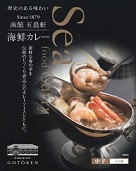
It's a convenience store, so it's open 24 hours a day. It seems that you can stop by after work, banquets in Ginza, and shopping in Nihonbashi!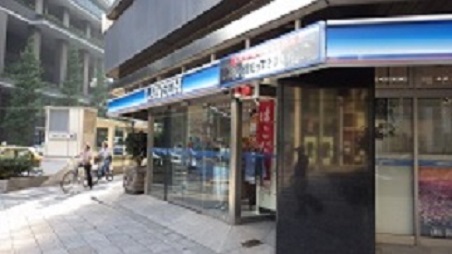
[Marsha Horiuchi of Edo]
August 5, 2015 11:00
The "Phiadelphia Museum of Art Ukiyo-e masterpiece exhibition" started at the Mitsui Memorial Museum until August 16.
I've been there.
In 1765, the mid-Edo period (1765), a color revolution occurred in Ukiyo-e, with a group led by ukiyo-e artist Harunobu Suzuki.
A new technology for multicolor printing was devised, and "Nishiki-e" was created. A work of art loved by the people
I think this is a technological advance to a more advanced level, and this is the breath of Edo people who pursue universal value more.
It makes me feel like it, and I thought that the ancient characteristics of Japanese aiming for height on that road appear.
This is an opportunity to appreciate homecoming goods from the United States, I would like to list my favorite works. In the heat and the hustle and bustle
When I lived, I felt that watching such works would be a desire for my heart.
If you like, spend a summer time with this print.
1."Yoshiwara Hanami" Torii Kiyocho
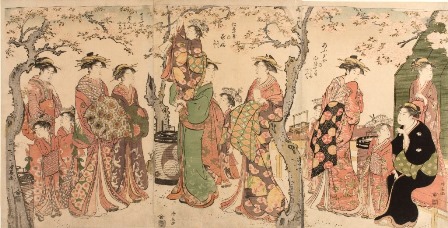
1785 (1785) Collection at the Philadelphia Museum of Art
Philadelphia Museum of Art:
Gift of Mr. and Mrs. Lessing J. Rosenwald, 1959
Exhibition period: July 22-August 16
(Copyright © 2015 Mithui Memorial Museum All Rights Reserved.)
2."Thirty-six Views of Mount Fuji" Katsushika Hokusai
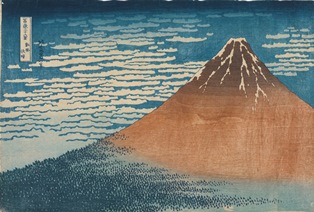
Tempo 1st ~ 3rd year (1830-32) Collection at the Philadelphia Museum of Art
Philadelphia Museum of Art
Gift of Mrs. Moncure Biddle in memory of Ernest Fenollosa, 1958
Exhibition period: Total period
(Copyright © 2015 Mithui Memorial Museum All Rights Reserved.)
3."Edobei of the third generation Oniji Otani" Sharaku Toshusai
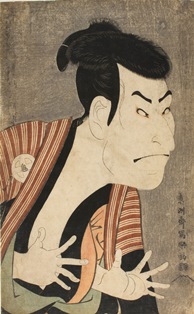
1794 (1794) Collection at the Philadelphia Museum of Art
Philadelphia Museum of Art
The Samuel S. White 3rd and Vera White Collection, 1956
Exhibition period: Total period
(Copyright © 2015 Mithui Memorial Museum All Rights Reserved.)
Mitsui Memorial Museum http://www.mitsui-museum.jp/
※Each image is owned by the Mitsui Memorial Museum. Secondary use is strictly prohibited.
[Nojinya]
August 5, 2015 08:00
It's red and cute Edo bus. It is an important foot of Chuo inhabitants, but it is a convenient vehicle for sightseeing in the city, and a lot of tourist information using Edo buses is introduced on the Chuo-ku correspondent blog.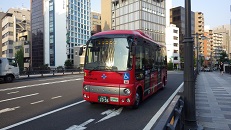
By the way, one day, when I walk along Yaesu Street, there is a covered bus stop (shelter) near the bus stop of the Tokyo bus! (left photo). Many 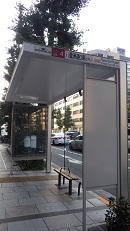 bus stops, especially Edo bus stops, are simple enough to have a single pole as shown in the photo at the bottom right, but bus stops, especially Edo bus stops, are simple enough to have a single pole as shown in the photo at the bottom right, but 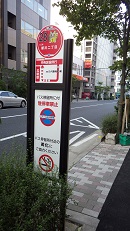 here in Yaesu Street "Ichiyoshi Securities (East of Yaesu Street)" The circulation bus stop has a fine roof and glass wall in addition to the bench, so it is safe to wait for the bus even when it is rainy or windy. It seems that it was newly established at the bus stop of Edo Bus last December, and it seems that there are already seven locations such as St. Luke Hospital, Harumi, Hamacho in front of Ichiyoshi Securities in Hatchobori. here in Yaesu Street "Ichiyoshi Securities (East of Yaesu Street)" The circulation bus stop has a fine roof and glass wall in addition to the bench, so it is safe to wait for the bus even when it is rainy or windy. It seems that it was newly established at the bus stop of Edo Bus last December, and it seems that there are already seven locations such as St. Luke Hospital, Harumi, Hamacho in front of Ichiyoshi Securities in Hatchobori.
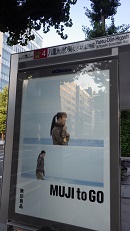 If you look closely, the glass wall next to the bus stop contains advertisements for fashionable fashion and cosmetics (pictured above), and the nearby sober city bus stop ("If you run a little bit, a different city ♪" : I feel the better urban sense compared to the photo below). If you look closely, the glass wall next to the bus stop contains advertisements for fashionable fashion and cosmetics (pictured above), and the nearby sober city bus stop ("If you run a little bit, a different city ♪" : I feel the better urban sense compared to the photo below). 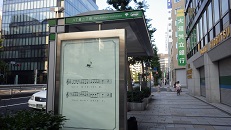 That should be the case, and it is a business originally started by French advertising agency JCDecaux, and it seems that the official name is "bus stop shed with advertisement". Advertisement fees from fashion companies that advertise on the side of the bus stop cover the cost of setting up and maintaining the bus stop, and Tokyo and Chuo-ku do not need to pay at all for the maintenance of the bus stop. It is based on the so-called PPP (public-private partnership). In the case of Chuo-ku, MC Decaux, a joint venture between JC Decaux and Mitsubishi Corporation, is implementing it, and in addition to Chuo-ku, similar bus stops with advertisements are being developed in 45 cities nationwide. It's a "bus stop", but when using the Edo bus from St. Luke Hospital, Hatchobori, Hamacho, etc., why not take a little care? That should be the case, and it is a business originally started by French advertising agency JCDecaux, and it seems that the official name is "bus stop shed with advertisement". Advertisement fees from fashion companies that advertise on the side of the bus stop cover the cost of setting up and maintaining the bus stop, and Tokyo and Chuo-ku do not need to pay at all for the maintenance of the bus stop. It is based on the so-called PPP (public-private partnership). In the case of Chuo-ku, MC Decaux, a joint venture between JC Decaux and Mitsubishi Corporation, is implementing it, and in addition to Chuo-ku, similar bus stops with advertisements are being developed in 45 cities nationwide. It's a "bus stop", but when using the Edo bus from St. Luke Hospital, Hatchobori, Hamacho, etc., why not take a little care?
[Nojinya]
10:00 on August 2, 2015
On Sunday morning, I usually sleep slowly, but before 6 o'clock in the morning, I can hear the sound of the music drums from a distance. Yes, today is the day when the ship imperial procession of Sumiyoshi-jinja Shirine Miya portable shrine takes place.
Looking from Chuo Daizu, several ships are gathered around the dock at Tsukuda Park.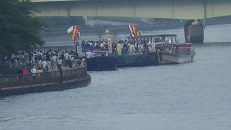
And in front of Tsukuda Lighthouse, there are so many people in the early morning. 。 。
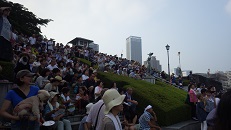
Miya portable shrine is already waiting for the departure on a barge.
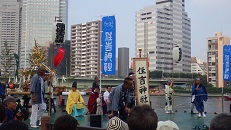 On the yellow boat on the other side, I continue to play music, probably in the middle of Taneo Wakayama. On the yellow boat on the other side, I continue to play music, probably in the middle of Taneo Wakayama.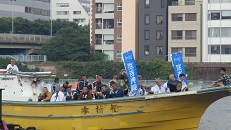
Before 7 o'clock in the morning, I was pulled by a tugboat and left for a barge in Miya portable shrine. There's a big applause. From now on, we will have a marine festival off Harumi and return here about an hour later.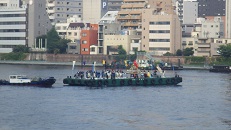
In the past (until 53 years ago), it seems that they used to carry Miya portable shrine on the underwater imperial procession entering the Sumida River, but now they go around Tsukuda and Tsukishima by boat. Just after writing the blog so far, the barge returned from the Toyosu Canal around the nose (Okawabata) of Paris Square with the sound of the music.
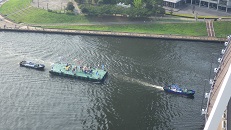 After arriving at Tsukuda Park, you will return to land and the imperial procession of Miya portable shrine will take place. After arriving at Tsukuda Park, you will return to land and the imperial procession of Miya portable shrine will take place.
More Miya portable shrine Ship imperial procession
|
Links
|


 The location is Kyobashi 2-chome. Just above Kyobashi Subway Station, opposite Tokyo Square Garden.
The location is Kyobashi 2-chome. Just above Kyobashi Subway Station, opposite Tokyo Square Garden. Not only Hakodate curry at Gotoken, but also squid, scallops,
Not only Hakodate curry at Gotoken, but also squid, scallops,





 bus stops, especially Edo bus stops, are simple enough to have a single pole as shown in the photo at the bottom right, but
bus stops, especially Edo bus stops, are simple enough to have a single pole as shown in the photo at the bottom right, but  here in Yaesu Street "Ichiyoshi Securities (East of Yaesu Street)" The circulation bus stop has a fine roof and glass wall in addition to the bench, so it is safe to wait for the bus even when it is rainy or windy. It seems that it was newly established at the bus stop of Edo Bus last December, and it seems that there are already seven locations such as St. Luke Hospital, Harumi, Hamacho in front of Ichiyoshi Securities in Hatchobori.
here in Yaesu Street "Ichiyoshi Securities (East of Yaesu Street)" The circulation bus stop has a fine roof and glass wall in addition to the bench, so it is safe to wait for the bus even when it is rainy or windy. It seems that it was newly established at the bus stop of Edo Bus last December, and it seems that there are already seven locations such as St. Luke Hospital, Harumi, Hamacho in front of Ichiyoshi Securities in Hatchobori. If you look closely, the glass wall next to the bus stop contains advertisements for fashionable fashion and cosmetics (pictured above), and the nearby sober city bus stop ("If you run a little bit, a different city ♪" : I feel the better urban sense compared to the photo below).
If you look closely, the glass wall next to the bus stop contains advertisements for fashionable fashion and cosmetics (pictured above), and the nearby sober city bus stop ("If you run a little bit, a different city ♪" : I feel the better urban sense compared to the photo below).  That should be the case, and it is a business originally started by French advertising agency JCDecaux, and it seems that the official name is "bus stop shed with advertisement". Advertisement fees from fashion companies that advertise on the side of the bus stop cover the cost of setting up and maintaining the bus stop, and Tokyo and Chuo-ku do not need to pay at all for the maintenance of the bus stop. It is based on the so-called PPP (public-private partnership). In the case of Chuo-ku, MC Decaux, a joint venture between JC Decaux and Mitsubishi Corporation, is implementing it, and in addition to Chuo-ku, similar bus stops with advertisements are being developed in 45 cities nationwide. It's a "bus stop", but when using the Edo bus from St. Luke Hospital, Hatchobori, Hamacho, etc., why not take a little care?
That should be the case, and it is a business originally started by French advertising agency JCDecaux, and it seems that the official name is "bus stop shed with advertisement". Advertisement fees from fashion companies that advertise on the side of the bus stop cover the cost of setting up and maintaining the bus stop, and Tokyo and Chuo-ku do not need to pay at all for the maintenance of the bus stop. It is based on the so-called PPP (public-private partnership). In the case of Chuo-ku, MC Decaux, a joint venture between JC Decaux and Mitsubishi Corporation, is implementing it, and in addition to Chuo-ku, similar bus stops with advertisements are being developed in 45 cities nationwide. It's a "bus stop", but when using the Edo bus from St. Luke Hospital, Hatchobori, Hamacho, etc., why not take a little care?

 On the yellow boat on the other side, I continue to play music, probably in the middle of Taneo Wakayama.
On the yellow boat on the other side, I continue to play music, probably in the middle of Taneo Wakayama.

 After arriving at Tsukuda Park, you will return to land and the imperial procession of Miya portable shrine will take place.
After arriving at Tsukuda Park, you will return to land and the imperial procession of Miya portable shrine will take place.
